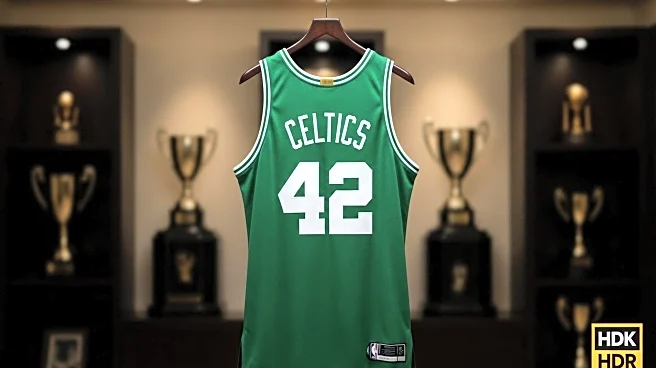What's Happening?
Al Horford, a veteran player for the Boston Celtics, has signed with the Golden State Warriors, marking the end of his tenure with the Celtics. Horford's departure has sparked discussions about whether his number should be retired by the Celtics, given his significant contributions to the team. During his seven seasons with the Celtics, Horford averaged 11.2 points, 6.8 rebounds, 3.6 assists, and 1.1 blocks per game. He played a crucial role in the team's success, including seven playoff appearances, one championship, two Finals appearances, and six Eastern Conference finals appearances. Despite limited individual honors, Horford's impact on the team's winning culture is undeniable, leading to debates about his legacy and the potential retirement of his jersey number.
Why It's Important?
The potential retirement of Al Horford's number by the Boston Celtics highlights the importance of team contributions over individual accolades. Horford's influence on the Celtics' success, including their first title since 2008, underscores the value of leadership and teamwork in professional sports. Retiring his number would honor his role in revitalizing the franchise and mentoring younger players like Jayson Tatum and Jaylen Brown. This decision could set a precedent for how teams recognize players who significantly impact their culture and success, even if they lack traditional individual honors.
What's Next?
As Horford transitions to the Golden State Warriors, the Celtics will need to adapt to his absence and find new leadership within the team. The decision on whether to retire Horford's number will likely involve discussions among Celtics management, fans, and possibly the new team owner, Bill Chisholm. The outcome could influence how the franchise honors players in the future and impact Horford's legacy in Boston. Meanwhile, Horford will aim to contribute to the Warriors' pursuit of another championship, adding to his career achievements.
Beyond the Headlines
The debate over retiring Horford's number touches on broader themes of legacy and recognition in sports. It raises questions about how teams balance individual achievements with contributions to team success. Horford's case may prompt other franchises to reevaluate how they honor players who have been instrumental in their success but may not have received significant individual awards. This discussion also reflects the evolving nature of sports culture, where teamwork and leadership are increasingly valued alongside personal accolades.









